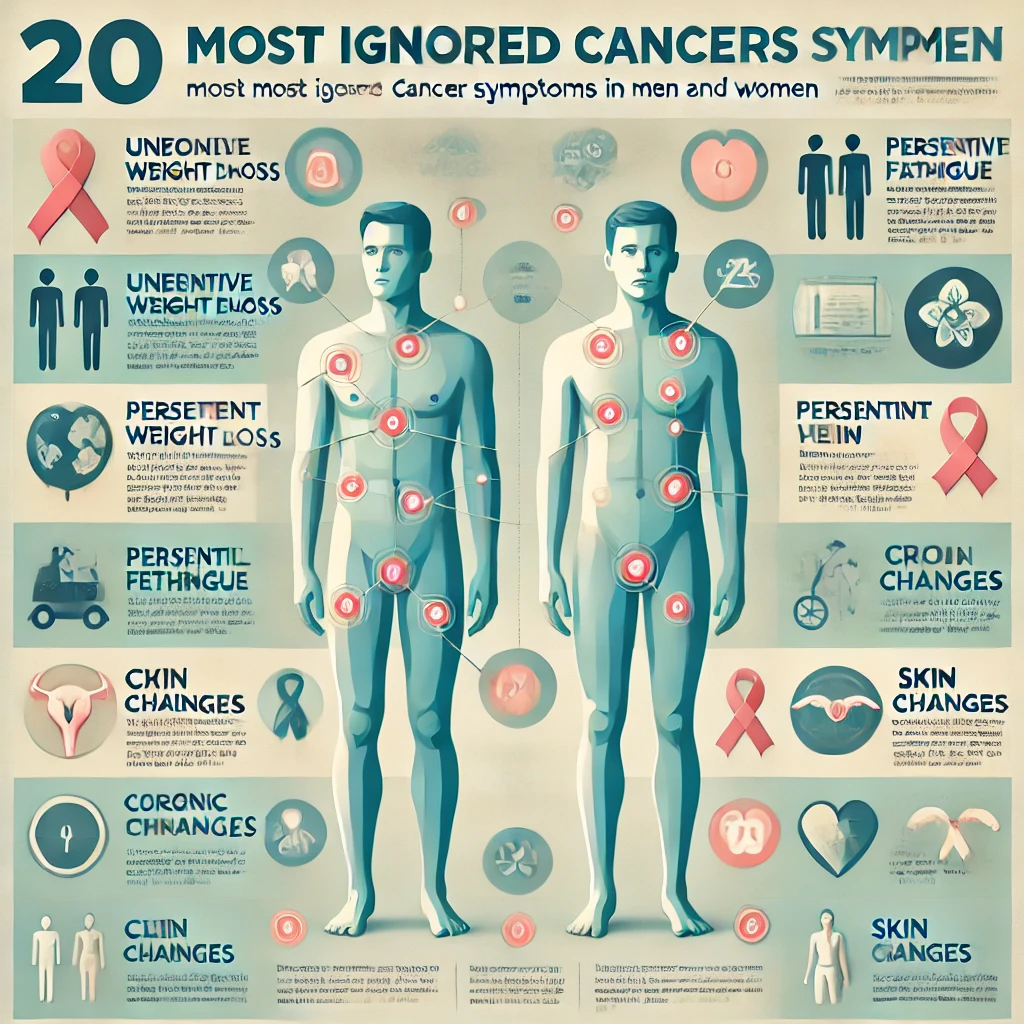
Cancer remains one of the leading causes of death worldwide, yet many people continue to overlook its early signs and symptoms. Recognizing these indicators is crucial for early detection and improved outcomes. In this article, we’ll outline the 20 most ignored cancer symptoms that both men and women should pay attention to.
Understanding the Importance of Early Detection
Early detection of cancer can drastically improve treatment success rates. Unfortunately, many individuals dismiss symptoms as benign or attribute them to stress or other non-serious conditions. Learning to recognize and respond to potential warning signs can be life-saving.
The 20 Most Ignored Cancer Symptoms
1. Unexplained Weight Loss
Sudden weight loss without a clear reason can be a sign of various cancers, including pancreatic, stomach, or esophageal cancer. If you lose more than 10 pounds without trying, consult a healthcare professional.
2. Persistent Fatigue
Feeling overly tired despite adequate sleep may indicate underlying health issues. It is particularly concerning when combined with other unexplained symptoms such as pain or changes in weight.
3. Changes in Skin
New moles or changes in existing moles, including irregular borders or multiple colors, may signify skin cancer (melanoma). Don’t ignore any noticeable changes in your skin.
4. Chronic Cough or Hoarseness
A persistent cough that lasts more than three weeks, or a hoarse voice, can be a warning sign of lung cancer or throat cancer. If accompanied by other symptoms, seek medical advice.
5. Unexplained Pain
Chronic pain, particularly if it has no clear cause, can be associated with certain cancers. Pay special attention to persistent back pain or headaches, which may indicate underlying issues.
6. Changes in the Breast or Nipple
For women, any lumps, swelling, or changes in breast shape or contour should be evaluated. Men should also be aware of breast changes, as male breast cancer, though rarer, can occur.
7. Bowel or Bladder Changes
Persistent changes in bowel habits, such as diarrhea or constipation, or changes in the frequency or characteristics of urination can be signs of colon or bladder cancer, respectively.
8. Difficulty Swallowing
Experiencing pain or difficulty when swallowing can indicate esophageal or throat cancer. If this symptom persists, don’t hesitate to seek medical evaluation.
9. Night Sweats
Excessive sweating during the night, especially if it disrupts sleep, can be a symptom of lymphoma or other cancers. Combine this symptom with unexplained fever or weight loss for the best assessment.
10. A Lump or Mass
Any new lumps or masses in the body should be investigated, especially those that increase in size over time. This can occur anywhere but is most often noticeable in the breast, testicles, or lymph nodes.
11. Changes in Appetite
A sudden change in appetite, such as a reduced desire to eat or feeling full quickly, can be linked to cancers of the stomach, liver, or pancreas.
12. Persistent Fever
A prolonged fever with no known cause may suggest an underlying condition, including certain types of cancer like leukemia or lymphoma.
13. Indigestion or Swallowing Problems
Chronic indigestion or lingering discomfort in the stomach can signify gastrointestinal cancers. If these issues are persistent, an examination may be warranted.
14. Unexplained Bleeding
Any instance of unexplained bleeding, such as blood in the stool, urine, or unusual vaginal bleeding, should be taken seriously as it may indicate colon, bladder, or uterine cancer.
15. Changes in Lymph Nodes
Swollen lymph nodes that do not return to normal size could indicate lymphoma or other cancers. Monitor any swellings that persist or grow.
16. Nails Changes
Dark stripes under the nails or changes in texture and shape can potentially indicate skin cancer or other health issues.
17. Molar Changes
New dental problems or sore gums that don’t heal may sometimes be an early sign of oral cancer—seek dental and medical evaluation if these persist.
18. Cognitive or Memory Problems
Uniquely troubling cognitive issues may warrant further investigation to rule out neurological problems which can also be linked to certain cancers.
19. Itching Skin
Sometimes considered an overlooked symptom, unexplained itching can occur in various cancers, including lymphoma, particularly when accompanied by other symptoms.
20. Changes in Voice Changes
A sudden change in voice or the development of a hoarse voice could be related to throat or vocal cord cancer and should not be ignored.
Conclusion
Recognizing these 20 ignored cancer symptoms can make a significant difference in early detection and treatment. While many of these symptoms may result from benign conditions, it is essential to consult a healthcare professional if you experience any persistent or concerning changes in your body. Early intervention is key in improving outcomes in cancer treatment—don’t ignore your body’s signals.
Call to Action
If you or a loved one is experiencing any of these symptoms, consult with a medical professional to discuss your concerns. Early detection saves lives!
By focusing on awareness and education, we can reduce the risks associated with cancer and help individuals make informed decisions about their health.







